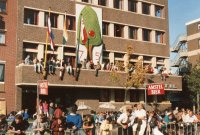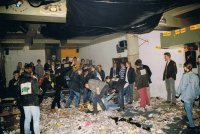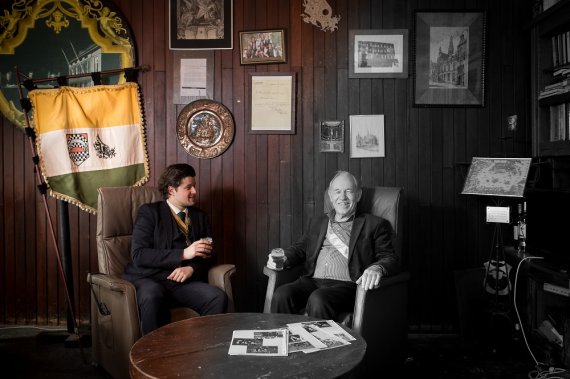Photos Sven Menschel and the KSV archive
What were the hot items for the KSV board 50 years ago?
Harry Geenen
: ‘There was a novelty in 1965: a woman on the board. KSV was a men’s society. There was a separate women’s society, which was a kind of sub-department of KSV. The ladies were sort of semi-members. They weren’t allowed in the bar after 11 o’clock at night. Towards 11 the lads would start singing a lullaby about “bedtime for little girls” and carried on until the ladies left the building. The board was all men, which was usual then. But in 1964 they asked a woman for the position of secretary. Apparently they couldn’t find a suitable man. Appointing a woman as secretary to a board was something that just didn’t happen in those days, but the woman in question didn’t want anyone mistaking her for a typist so they adopted Latin for board positions and she was the club’s first abactis. She also said, “I’m on the board, for goodness sake, and yet I’m not allowed into the bar in the evening. That’s not on.” So the rules were changed. This led to a lot of discussion but that is always the case when something changes in a society.’
Matthijs Verburg
: ‘I take it for granted that women are fully involved in the society. Nowadays there are more women members than men. The board is always roughly fifty-fifty too, and we have had female presidents. What I do find, especially now I am on the board, is that people are indeed very resistant to change. But that has its uses, too, because it forces you to examine your plans even more carefully.’
What was society life like in 1965?

Geenen:
‘In my day students didn’t live in student houses or flats like they do now, but in lodgings with a landlady. Usually you weren’t allowed to cook there, so you were dependent on the canteens at the student societies for your hot meal. So students were at the society at least five days a week. And for the same reason 95 percent of the students were members of a society. What is more, the only entertainment in Wageningen was at the student societies; there weren’t many pubs. So society life was more central. That was where you made friends and met people.
Verburg
: ‘There are a lot more options nowadays. There are members who are extremely involved in the society and come several times a week, but there are also members who don’t feel the need to be here regularly. Students also have the facilities now to cook in their own rooms or flats. We renovated our canteen last summer. The kitchen was far too big for the number of people who eat here. Something else that has changed is the attitude of students. They have to get through their degree very fast and they also want to do as many career-oriented activities as possible, to put on their CVs.’
It was completely normal to take seven years to get your degree
Geenen: ‘In my day it was completely normal to take seven years over getting your degree. Passing the first year was a major hurdle, but after that it was normal to do all kinds of extra-curricular activities.’
What were the ‘hazing’ initiation rituals like in the 1960s?
Geenen: ‘I did my military service first and joined KSV at 21. And then you get mucked about by kids of 18 lording it over you. I found that extremely irritating because I thought it was so childish. In my day the new students still had to have their heads shaved. They had to walk on all fours and beer was thrown at them. It was all so humiliating that I thought it was really borderline as a way of treating people. I still feel uncomfortable when I meet people involved in my hazing. I still don’t get how you can behave so… sadistically, almost.’
Verburg:
‘Nowadays the initiation rituals are subject to strict regulation. The university wants guidelines drawn up which include the proviso that the prospective members get enough sleep.’
In 1965 the foundation stone was laid at the current clubhouse on the Stadsbrink. What is the state of the building 50 years later?

Verburg
: ‘The balcony had to be fixed three years ago and the renovation of the canteen last summer was another major investment. This year we need to keep track of the finances and see whether we can afford to stay here.’
Geenen
: ‘Back then the board wasn’t involved in the management of the building at all; that was done by a building committee. Before we moved we were in a former parsonage on the Heerenstraat, which we probably rented for next to nothing. It was a dilapidated building and not a cent was spent on it. The idea was that the new building should be robust. The lamps, for instance, were all designed to be strong enough to hang from them.’
Verburg
: ‘That was our approach to our renovations too. The contractor came along with several sample floors and we tested their durability with keys and nails. There was only one floor that withstood the test. That’s the one we chose’.
Jubilee
To celebrate its 105th anniversary, student society KSV Franciscus is holding an Electric Run on the Binnenveld on Friday 18 March. A running event taking participants past laser shows and light installations, with a musical accompaniment. The Run is open to all. Curious about the Electric Run or other anniversary activities? Look on lustrum.ksvfranciscus.nl or email secretarisluco@ksvfranciscus.nl.

